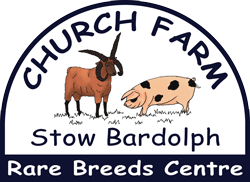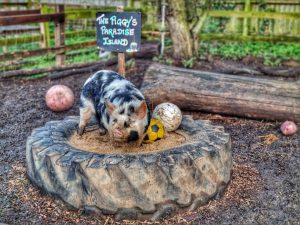
Kune Kune pigs (pronounced Kooney Kooney) were probably brought from Southern Asia to New Zealand by whalers who traded them with the Maori people. It is a Maori name and means fat and round. They were allowed to roam freely, including in and out of the Maori homes, and so became domesticated. They make excellent pets and if you can bear it, good meat. The Kune Kune was introduced into Britain in 1992.

Small, fat and round, the Kune Kune usually have Piri Piri (tassels) under their chins (their function is not known), and are multi-coloured and very hairy with coloured skin that protects them from sunburn. They have prick ears and a slightly dished face. Boars will grow tusks as they get older. Theses pigs are quick to learn and are extremely friendly, thriving on human company. They are intelligent and can be trained to sit for their food or even on occasions be house trained. The Kune Kune is ideally suited for outdoor production during the summer because it is a natural grazer and can survive on grass. However in wet weather it has a tendency to root for grubs.
Kune Kune. Kune Kune pigs (pronounced Kooney Kooney) were probably brought from Southern Asia to New Zealand by whalers who traded them with the Maori people. It is a Maori name and means fat and round. They were allowed to roam freely, including in and out of the Maori homes, and so became domesticated. They make excellent pets and if you can bear it, good meat. The Kune Kune was introduced into Britain in 1992.